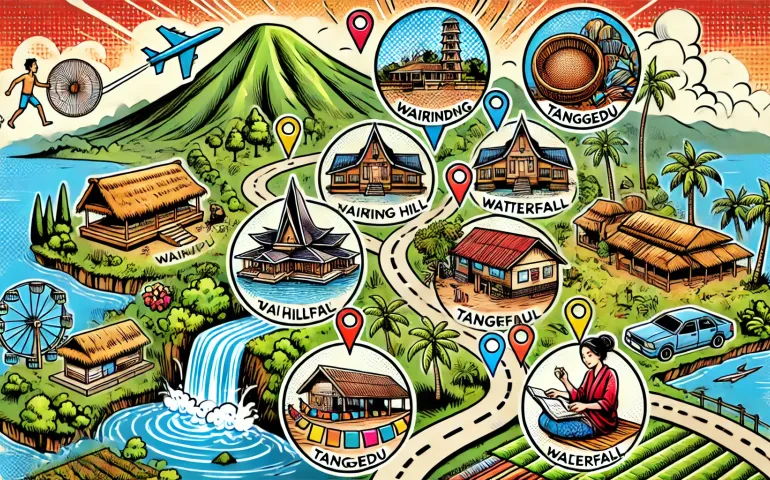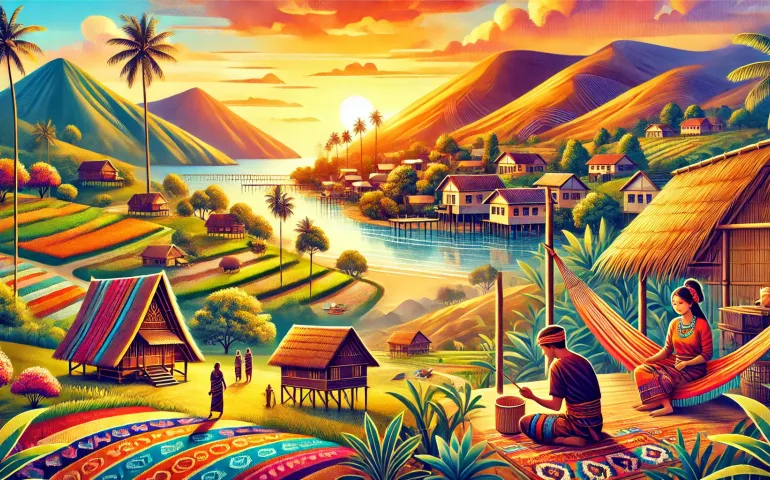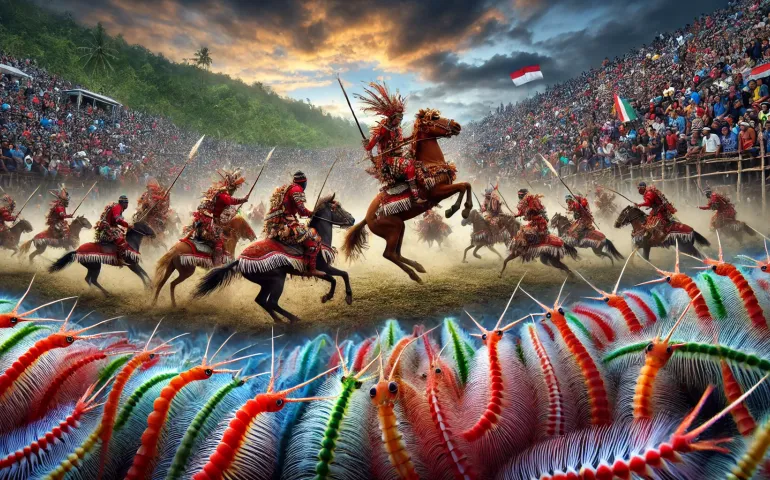About Place
- "An untouched paradise"
- "A cultural treasure trove"
- "A serene escape"
Reasons to Visit
- Traditional Ikat Weaving: Waingapu is renowned for its traditional ikat weaving, a technique that has been passed down through generations. The intricate patterns and vibrant colors of the ikat textiles are not only beautiful but also hold deep cultural significance. Visiting local weaving villages, such as Prailiu and Lambanapu, allows you to witness artisans at work and purchase unique handwoven fabrics directly from the makers.
- Stunning Natural Landscapes: The landscapes around Waingapu are truly breathtaking, from the rolling savannahs to the pristine beaches and crystal-clear waters. One standout location is Wairinding Hill, offering panoramic views of the surrounding valleys and hills, especially enchanting at sunrise and sunset. Additionally, Tanggedu Waterfall, often called the "Grand Canyon of Sumba," is a natural wonder worth exploring.
- Rich Cultural Traditions: Waingapu is steeped in cultural traditions, including unique ceremonies, dances, and rituals. The Pasola festival, celebrated in February or March, is a thrilling spectacle where horsemen engage in mock battles to ensure a good harvest. Experiencing this event offers a deep dive into the island's cultural heritage and community spirit.
Visa
- Indonesia Visa Requirements:
- From the United States, Canada, and most European countries: Visa-free entry for up to 30 days.
- From Australia and New Zealand: Visa-free entry for up to 30 days.
- From ASEAN countries: Visa-free entry for up to 30 days.
- From India and China: Visa on arrival for up to 30 days, extendable for an additional 30 days.
- From other countries: Check with the Indonesian embassy for specific requirements, which may include visa on arrival or needing to apply in advance.
Travel Expenses
- Travel to & from Destination:
- Approximate cost for a round-trip flight from Jakarta to Waingapu: $200 per person, total $400 for two.
- Hotel Cost:
- Average cost per night: $50
- Total for 3 nights: $150 per room, total $300 for two.
- Food Cost:
- Lunch: $10 per person per meal, total $20 per day, $60 for 3 days.
- Dinner: $15 per person per meal, total $30 per day, $90 for 3 days.
- Total food cost for two: $150
- Activity Cost:
- Visits to villages and local attractions: $50 per person, total $100 for two.
- Tanggedu Waterfall trip: $30 per person, total $60 for two.
- Total activity cost: $160
- Near Destination Travel Cost:
- Rented car for 3 days: $50 per day, total $150.
- Fuel and additional travel expenses: $50
- Total transport cost: $200
Total Estimated Travel Expenses: $1210

Best Itinerary
Day 1: Arrival and Introduction to Waingapu Arrive in Waingapu and check into your accommodation. Spend the morning exploring the town, visiting the local market to get a feel for the local culture. Have lunch at Rumah Makan Padang Murah Meriah, where you can try traditional Indonesian dishes. In the afternoon, visit the Prailiu village to witness ikat weaving and purchase souvenirs. Enjoy dinner at Warung Kaka, known for its fresh seafood, and then take a stroll along the beach to enjoy the serene night ambiance.
Day 2: Exploring Natural Wonders Start your day early with a visit to Wairinding Hill to catch the sunrise. Spend the morning hiking and enjoying the panoramic views. Return to town for lunch at RM Bambu Kuning, which offers a variety of Indonesian and local Sumbanese dishes. In the afternoon, head to Tanggedu Waterfall for a refreshing swim and explore the beautiful canyon. Have dinner at Elvin's Cafe and Restaurant, known for its relaxed atmosphere and delicious local cuisine. End the day with a quiet evening at your hotel or a beach walk.
Day 3: Cultural Immersion Dedicate this day to experiencing Sumba's rich cultural heritage. Visit the Lambanapu village in the morning to see more ikat weaving and learn about the local traditions. Have lunch at a local warung (small restaurant), trying dishes like ayam bakar (grilled chicken) or nasi goreng (fried rice). In the afternoon, explore the Pasola Festival grounds if your visit coincides with the event, or visit the local museums to learn about Sumba's history and culture. Dinner at Rumah Makan Selera Nusantara will offer you a taste of diverse Indonesian flavors. Spend the night enjoying local music and dance performances if available.

Safety Tips
- Always carry a copy of your passport and visa.
- Respect local customs and traditions.
- Drink bottled water to avoid stomach issues.
- Use sunscreen and stay hydrated.
- Be cautious of your belongings in crowded places.
- Avoid isolated areas at night.
- Learn a few basic phrases in the local language.
- Keep emergency contact numbers handy.
- Use registered taxis or reputable car rental services.
- Stay updated on local news and travel advisories.
Flights
- From Jakarta to Waingapu: Garuda Indonesia, Lion Air
- Estimated flight duration: 2.5 hours
- Cost: Approximately $200 round trip per person
Hotels
- Padadita Beach Hotel
- Morinda Villa and Resto
- Nihiwatu Resort
- Tanto Hotel
- Sacca Residence
Contacts
- Indian Embassy (Jakarta): +62 21 5204150
- Police: 110
- Ambulance: 118
- Firefighters: 113
Country
Closet Airport
- Umbu Mehang Kunda Airport (WGP)
Nearest City
- Kupang
Heritage Sites
Ratenggaro Traditional Village
Airlines
- Garuda Indonesia
- Lion Air
- Wings Air
Currency
- Indonesian Rupiah (IDR)
Languages Spoken
- Indonesian
- Sumbanese
Real Story
The Tale of the Pasola Festival: A Tradition of Valor and Ritual
The Pasola Festival, an annual event celebrated by the Sumbanese people, is a vivid illustration of the island's rich cultural heritage and spiritual beliefs. Rooted in the traditions of the Marapu religion, which emphasizes ancestor worship and harmony with nature, the Pasola is more than just a festival; it is a ritual that connects the present to the past.
The origins of the Pasola are shrouded in legend. It is said that in ancient times, a noblewoman named Rambu Kaba left her village and fell in love with a man from another tribe. Her return to her village coincided with the arrival of colorful sea worms, known as nyale, which were seen as a sign from the ancestors. The villagers interpreted this as a divine signal to start the Pasola, a ceremonial battle that would bring prosperity and balance.
The festival takes place in February or March, timed with the appearance of the nyale on the beaches of West Sumba. The event begins with a gathering of priests who perform rituals to summon the spirits of the ancestors. Once the nyale are collected, the main event begins: two teams of horsemen, dressed in traditional attire, ride against each other wielding wooden spears. The spectacle is both thrilling and perilous, as the riders display incredible skill and bravery.
The Pasola is not merely a game; it is imbued with spiritual significance. The spilling of blood during the event is believed to fertilize the soil and ensure a good harvest. The festival also serves as a means of conflict resolution, where disputes between tribes can be settled through this ritualized combat. Despite its violent appearance, the Pasola is governed by strict rules to ensure that no one is seriously harmed.
Over the years, the Pasola has become a symbol of Sumbanese identity and resilience. It attracts visitors from around the world who come to witness this extraordinary event. However, for the local people, it remains a deeply personal and spiritual experience, a time to honor their ancestors and reaffirm their cultural values.
Cuisine
The cuisine of Waingapu and Sumba is a delightful blend of traditional Indonesian flavors with unique local touches. Sumbanese food often features fresh, locally-sourced ingredients like seafood, coconuts, and various herbs and spices. One of the most distinctive dishes is kapu pahapa, a traditional Sumbanese grilled pork seasoned with turmeric and other spices. Another popular dish is ikan bakar, which is grilled fish served with sambal (spicy chili sauce) and rice. The use of exotic spices and traditional cooking methods, such as grilling over an open flame or slow-cooking in banana leaves, gives Sumbanese cuisine its distinctive flavor and appeal.

Culture and History
Waingapu, and the broader island of Sumba, is a cultural enclave where traditional ways of life persist. The island's residents are known for their distinctive customs, ceremonies, and art forms. One of the most prominent cultural practices is the ikat weaving, a labor-intensive process that involves dyeing threads before weaving them into intricate patterns. This craft is predominantly carried out by women in villages like Prailiu and Lambanapu. The designs often tell stories of ancestors, myths, and daily life, reflecting the deep connection between the community and their heritage.
The Pasola Festival is another significant cultural event, characterized by ritual battles on horseback. This event is deeply spiritual, marking the start of the rice-planting season and involving elaborate ceremonies to honor the spirits of ancestors. Participants, armed with wooden spears, engage in symbolic combat that is believed to ensure a bountiful harvest. The festival is not just a spectacle but a profound expression of Sumbanese culture and belief systems.
Sumba's architectural heritage is also noteworthy. Traditional houses, or uma mbatangu, feature high-pitched thatched roofs and are often built on stilts. These structures are not merely homes but are imbued with spiritual significance, serving as centers for family and communal rituals. The megalithic tombs scattered across the island further underscore Sumba's rich cultural tapestry, with these ancient structures serving as resting places for nobility and embodying the islanders' reverence for their ancestors.
Despite modern influences, the people of Waingapu and Sumba remain deeply rooted in their traditions. Visitors have the unique opportunity to engage with a culture that has preserved its identity through centuries, offering a glimpse into a way of life that is both timeless and resilient.
